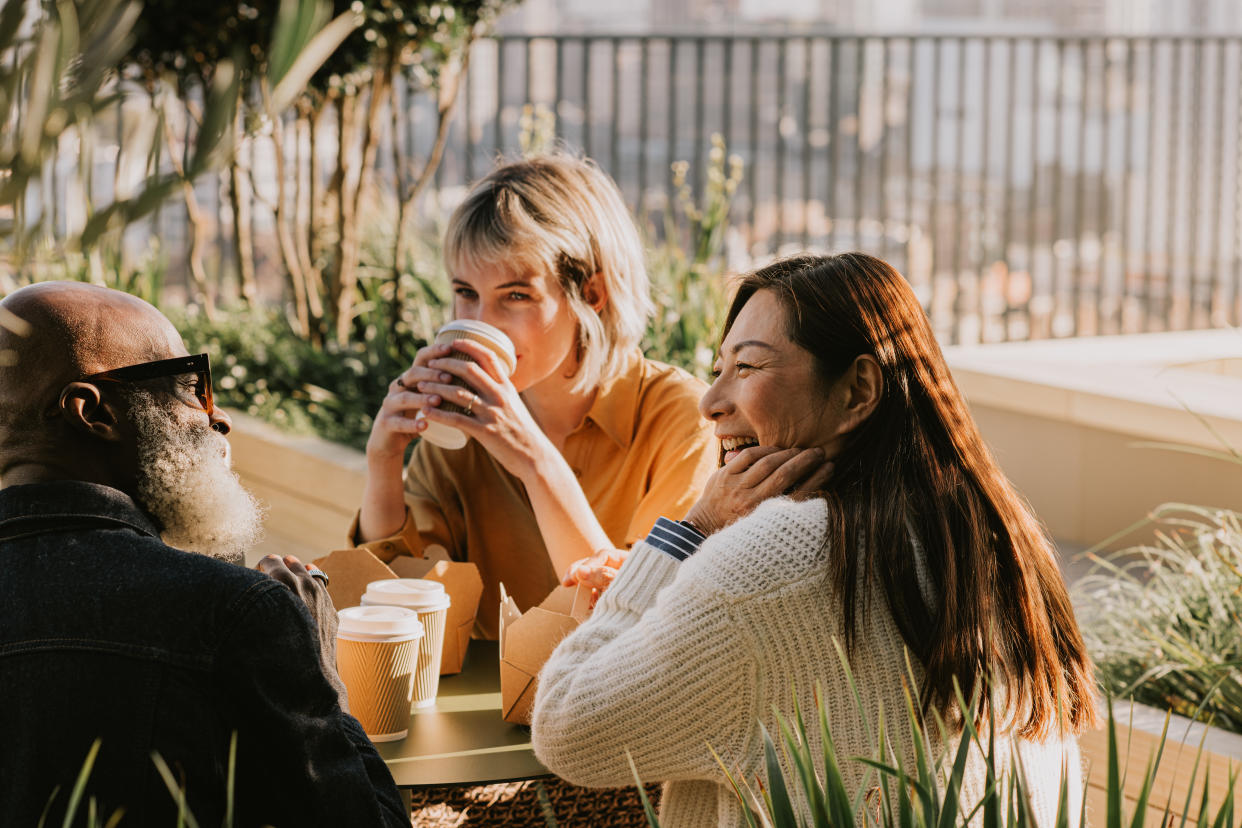Maintaining intergenerational friendships have helped me age well. Here's how.

When my husband and I were newlyweds moving into our first apartment, most tenants were, like us, in their mid-20s. It was the demographic we thought we preferred, but the most welcoming people in the building were two senior retirees who rented the apartment below us. Shortly after we moved in, they invited us over for Friday cocktail hour — a fun evening that became a weekly ritual that cemented our friendship during the two years we lived there. I loved hearing about their nostalgic romance from the 1940s and the children they raised. The experiences they shared helped us view the world through the lens of an older but wiser generation.
Now that I'm a grandmother on the other side of intergenerational friendships, I understand why the retirees enjoyed our company. Cultivating a circle of friends 15 to 20 years younger is like drinking from the fountain of youth; these relationships are a vital source of renewed energy, optimism and influence that help me age well.
I first recognized the benefits of age-gap friendships when my adult children brought their friends over to hang out on the weekends. Listening to their perspective on politics, environmental issues, parenting and social trends was a refreshing change from the conforming societal expectations of my own youth. On the lighter side, they also introduced me to microbreweries and funny TikTok memes.
While I still enjoy the company of people my age, I find myself gravitating toward younger people for personal growth and a youthful outlook on life. There have been plenty of opportunities for me to meet young friends since I live in a close-knit neighborhood surrounded by young homeowners. We've bonded across the picket fences with our shared interests in family, community, travel and pop culture, proving that age doesn't matter when it comes to friendship.
But what is it about cross-generational relationships that attracts Gen X-ers and millennials? My close friend Rachel Brown, who is 20 years younger than me, has an answer for this. "Most of our friends are our age — in their 40s — and the majority are our children's friends' parents," she says. "This has its benefits, but our conversations often revolve around the kids. With older friends, we learn different perspectives from their experiences and have new topics to discuss, not just about raising kids."
Rachel adds, "I also see the older generation as having a more laid-back approach to life. They're past the hustle and bustle of raising a young family and working a nine-to-five schedule. They aren't competitive or out to prove anything, and tend to be more genuine in the friendship."
Numerous studies point to the benefits of intergenerational friendships, confirming that such relationships can be long-lasting and meaningful and can help foster a positive attitude about aging. More importantly, friendships can also reduce the risk of loneliness many older adults experience. According to U.S. Surgeon General Vivek Murthy, a lack of social connection can significantly increase the risk of heart disease, stroke, dementia and premature death in older adults.
Kasley Killam, a Harvard-trained social health expert and author of The Art and Science of Connection, agrees that there is much to be gained by connecting with those who are older or younger than us. According to Killam, if you connect meaningfully with someone else, your friend chemistry will transcend the age gap.
"Intergenerational friendship is a bidirectional gift, with older and younger people benefiting from the exchange of perspectives and wisdom," she tells Yahoo Life. "Studies have shown that the more diverse your social ties, the better it is for your health and well-being. Cultivating friendships across ages, different backgrounds, beliefs, ethnicities and cultures benefits all generations."
When I was younger, I suffered from too many insecurities rooted in competitiveness with my peers, which caused several friendships to wither before they could bloom. But at 64, I'm finally comfortable in my skin without needing to impress anyone. Worrying about measuring up to others' expectations was a waste of time and a burden I'm happy to be free of.
While it's true that my younger friends and I are in different stages of our lives, we still learn new things from each other's experiences. Mentorship also plays a vital role in these relationships, but more importantly, I enjoy being the inspiration that helps them embrace aging rather than dreading it. After all, the best part of my life began after I turned 60 — a time of hard-earned wisdom, compassion and freedom.
My intergenerational friendships, meanwhile, are the daily dose of youthful energy I need. Because of these endearing relationships, I'll be forever young at heart.
Marcia Kester Doyle is the author of Who Stole My Spandex? Life in the Hot Flash Lane and the voice behind the midlife blog Menopausal Mother. She is a regular contributor to AARP the Magazine, with her work also appearing in the New York Times, the Washington Post, HuffPost, Cosmopolitan, Good Housekeeping, Woman's Day and many others. She lives in sunny South Florida with her husband and has four adult children, four grandchildren and two feisty pugs.


